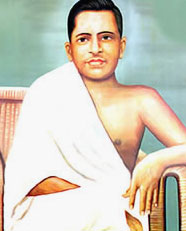Nellore District formed part of the composite Madras State
until 1
October 1953.
On 1
November 1956,
when the states were reorganized on a linguistic
basis, this district came under
Andhra Pradesh. The city of Nellore attained the status of a
Municipal Corporation in 2004. This area is rich in particular kind of flint called quartzite,
out of which
prehistoric man made his weapons and implements.

Nellore played a major role in the formation of Andhra
Pradesh state.
Potti Sriramulu, a Telugu patriot and activist, who fasted to death for the
formation of Andhra Pradesh state within the Indian Union was born in Nellore. Nellore
also has strategic commercial importance as it lies between the cities of Vijayawada
and Chennai.
This District has Historical
importance. This place was under the rule of Satavahanas, Cholas, Pallavas,
Telugu Chodas, Kakatiyas, Vijayanagara kings, Golkonda Nawabs and Britishers.
Nellore Town is also called as
Vikrama Simhapuri.
This was under the rule of Manuma Siddhi in the 13th century. During this period
Thikkana Somayagi was the Minister in the Royal court. He completed 15 cantos of
Maha Bharat started by Nanaiah. Thikkana who hails from this district first
wrote Nirvachanothara Ramayanam
With the rise of the
Mauryan Empire, Nellore seems to have come under its influence and was part
of the Ashokan
empire in the third century B.C. The district was next included in the Pallava
dominion between the fourth and sixth centuries A.D. With the dawn of the
seventh century, the political centre of Gravity of the Pallavas shifted to the
south and weakened their power, the north. During the
British period, the district tasted the blessings of settled peace, the only
event of any political importance being the
sequestration in 1838, of the Jagir of
Udaygiri, owing to its title holder's participation in a conspiracy,
engineered by the Nawab of Kurnool, against the ruling power. After the district
came under the British administration, the jurisdiction of the district did not
undergo any major changes, but for the transfer of Ongole taluk in
1904 to
Guntur district when it was newly constituted. During British period, 'Nellore'
was the only education center in the regions that constituted the current day
Andhra Pradesh.